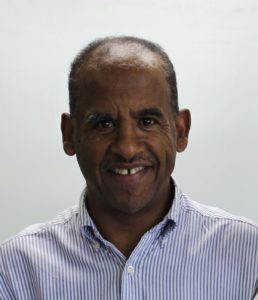
Rev. Dr. Solomon Yadessa
What languages do you speak?
I was born in Ethiopia into an Oromo family and grew up speaking the Oromo language. In school I studied Amharic, which is the official language of Ethiopia. Additionally I am fluent in English and am able to converse in Tigrigna, Anyuak, Sidamo, and Arabic.
Where did you earn your degrees?
I earned a Bachelor of Theology from Mekane Yesus Seminary in Addis Ababa, Ethiopia; a Bachelor of Divinity from the Association of Theological Institutions in Nairobi, Kenya; a Master of Arts in Theology, Development, and Evangelism from Warburg Theological Seminary in Dubuque, Iowa; and a Ph.D. in Missiology from Concordia Theological Seminary in Fort Wayne, Indiana.
What inspired you to become a Lutheran minister?
I was born into a Lutheran family. My father was a pastor of Mekane Yesus church, which was formed from the merging of Presbyterian and Lutheran mission efforts. I was taught the importance of God’s grace, faith, law, and Gospel. I believe the core teachings of true Lutheranism: that we have salvation by grace through faith in Christ who paid all the cost for our salvation, that the Bible is the inherent word of God, and that the body and blood of Jesus was given for the forgiveness of sins.
How was the Multi-Ethnic Ministry of North Texas established?
The Multi-Ethnic Ministry of North Texas reaches out to African refugees and immigrants. It originally began as an Ethiopian Oromo Lutheran outreach in Dallas and Irving. Over time it grew as we reached out to comfort other families in need. In August 2016 we began holding Karibu – welcome in Swahili – fellowship worship services in Swahili. Word spread and more people began attending. They loved the service and songs in their own language. We also began a youth service on Saturday evenings and transported children with their parent’s permission to attend Bible study, play games and share a small meal. In July 2017 the LCMS Texas District Area B, Faith in Plano, and Our Redeemer in Dallas launched the Multi-ethnic Ministry of North Texas and called me as the ministry missionary. Since then the ministry has grown and serves people from China, the Congo, El Salvador, Eritrea, Ethiopia, Iraq, Mexico, Nepal, the Philippines, Rwanda, Somalia, Sudan, Turkey, and the United States.
You have been called an urban missionary – what does this mean?
Urban mission is part of missiology that strives to meet people in settings such as apartments, business locations, streets, and hospitals and to share the good news of God’s grace through faith in Christ. Previously Europeans and Americans would travel and cross international boundaries to meet people. In this age God is sending people to Europe and America through business, education opportunities, and refugee and immigration programs. The question is how much do European and American churches use these opportunities for God’s mission? In the urban areas in America I have more opportunity to do mission work than when I was in Africa. The percentage of receptivity of the hearers may vary, but there is more opportunity to share the Gospel here. The urban setting is a fertile place for missions.
What is the wholistic approach to your ministry?
I like this word, which comes from the Greek word Holos, meaning whole. Jesus used this word repeatedly when he declared sins forgiven and granted physical healing. A wholistic ministry strives to care for all aspects of a person’s wellbeing, including spiritual, physical, emotional, social, professional, and academic. Apostle Paul used this word in 1 Thessalonians 5:23, “And the very God of peace sanctify you wholly; and I pray God your whole spirit and soul and body be preserved blameless unto the coming of our Lord Jesus Christ.”
